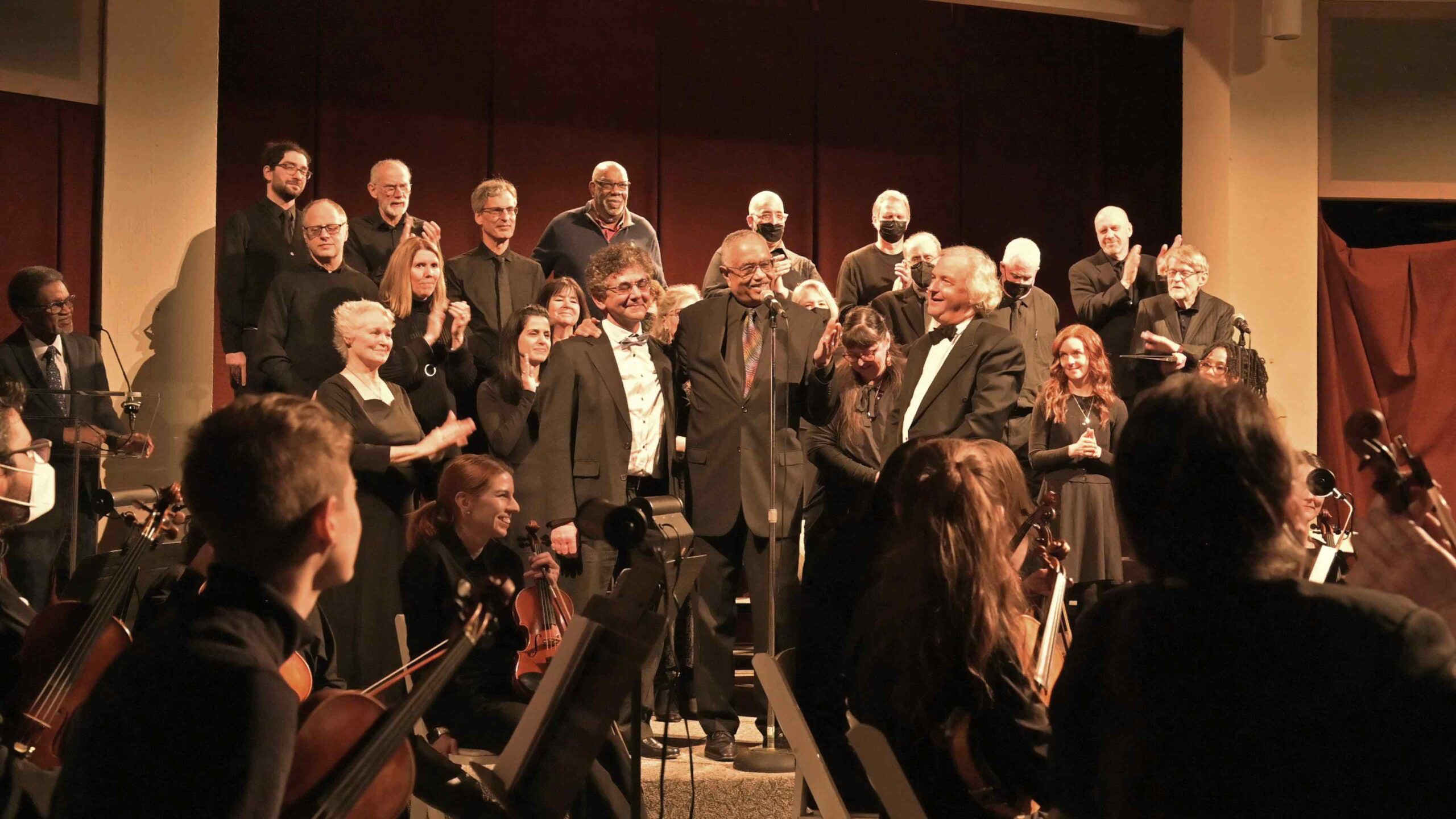

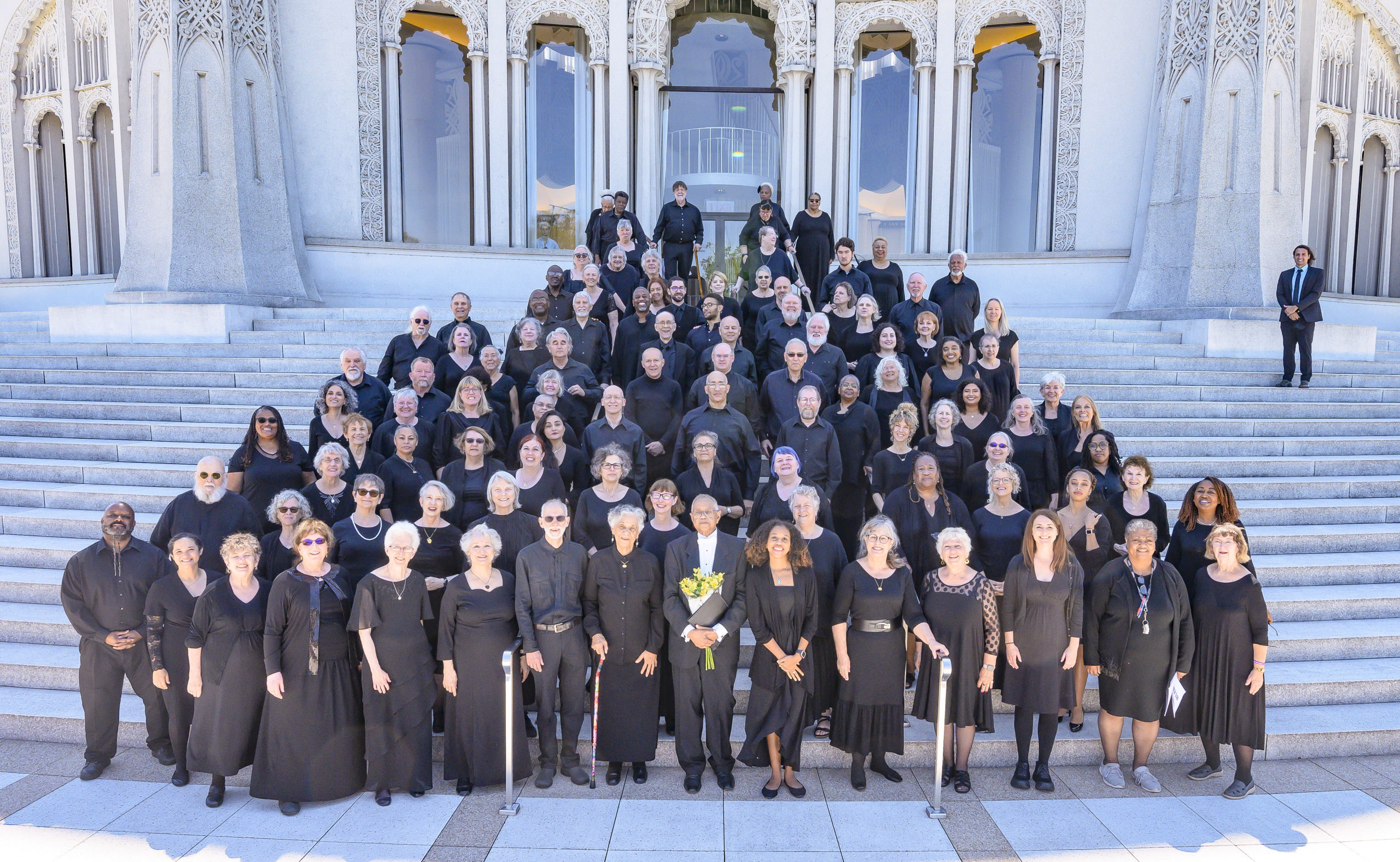

By James Humphrey
In a time of uncertainty, in the wake of more than two years’ isolation for many, some 130 singers from across the continent and beyond came together in early July for the 14th annual Bahá’í Choral Festival. For them, as well as for about 900 who gathered from around the Chicago area for music and prayer in the sanctified atmosphere of the Bahá’í House of Worship in Wilmette, Illinois, the array of experiences was memorable:
Starting in 2006, the devotional concerts of the Choral Festival have become a highlight event each year in Chicago’s North Shore suburbs. They routinely draw a thousand or more people to the House of Worship, many for the first time.
Holy Day observance planned
Because this year’s morning and afternoon devotional concerts were planned for July 10 — a Baha’i Holy Day, the Anniversary of the Martyrdom of the Bab — the program was tailored to that occasion from the start, says Van Gilmer, House of Worship music director, who organized the festival alongside assistant Rodrigo Ferreira.
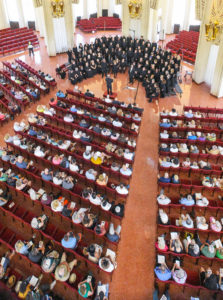
As House of Worship staff was aware that most of the public would be unfamiliar with the concept of two major Messengers of God playing roles in the founding of the Baha’i Faith, the printed program included a few paragraphs’ summary of the mission and Martyrdom of the Bab — who was the herald of Baha’u’llah, Founder of the Baha’i Faith.
For the 9:30 a.m. and 1 p.m. concerts, Gilmer chose music, readings and prayers that were “about going to the next world, and about the beginnings of the Faith,” he says.
Choral selections were in styles as diverse as Baroque, Gospel, Negro Spiritual and 20th-century hymns, including compositions by several Baha’is including Gilmer. Their text, along with readings offered in between, came from Baha’i, Judeo-Christian and Islamic scripture. Their mood ranged from solemn — “Is There Any Remover of Difficulties” and “Ghol Ala,” both associated with the tragedies of early followers of the Bab — to pious and entreating — “Salvation Is Created” and “Let Not Your Heart Be Troubled” — to exultant — “O Son of Being Love Me!” and “Lift Up Your Heads.”
Only miles from a tragic event
Then local tragedy added to the event’s significance. The July 4 mass shooting in Highland Park took place only 11 miles north of Wilmette. And it was even closer for Choral Festival participants. Rehearsals and other activities were scheduled starting July 7 in a hotel “just across the road from Highland Park,” Gilmer says.
So during the days of rehearsal, some Baha’is from Highland Park, along with a national Baha’i official, were invited to have lunch and “share any reflections about the [July 4] incident with the choir,” says Tom Gindorff, a member of the Local Spiritual Assembly serving Bahá’ís in that suburb. Senta Plunkett, president of the Village of Wilmette, came to the hotel to greet the singers and share a sincere message to Wilmette in the wake of the shootings.
As a result, special prayers were added to the morning devotional concert for the Highland Park victims and their families, for all victims of senseless violence, and for America’s healing.
This gave Baha’is from Highland Park a special reason to be present. Cecilia Antezana Marshall and Doug Marshall had been right on the scene. They had to shelter behind a concrete pillar only a few dozen feet from where a gunman on a rooftop began targeting spectators at the Independence Day parade, killing seven and wounding dozens.
Both have advanced first aid and CPR training, and were among the first out into the streets to help. Their recollections were stark:
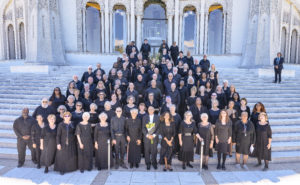

A healing effect
So how do they gain help from the prayers of a few hundred in a sacred spot?
“It’s a release,” Cecilia said after the morning devotions and concert. “When you’ve seen something like this, you can be filled with negative feelings, and the prayers can help you let some of that go.”
Doug added that “going in and being of service right away” might possibly have helped reduce his own sense of shock in the aftermath. It was additionally heartening that the community’s grief was acknowledged at the choral program.
House of Worship staff estimates only about one-third of the attendees were enrolled Bahá’ís. It was unknown how many came from Highland Park.
As usual for this public-invited occasion, the normal guidelines for meditative silence in the Auditorium were relaxed, and attendees showed warm appreciation through standing ovations at each concert. In the afternoon, spontaneous applause followed the reading of a passage from Bahá’u’lláh: [These fruitless strifes, these ruinous wars shall pass away, and the ‘Most Great Peace’ shall come.]
Still, the overall atmosphere of silence was comforting, says Alice Lonoff, who lives in Northbrook just south of Highland Park and has collaborated with Gilmer and other Baha’is as part of the organization Racial Awareness in the Northshore (RAIN). “Once the concert started I loved the readings and the beautiful music, they also filled me with peace,” she shares. “Afterward, my friend and I walked around the entire circle and looked down on all of the beautiful gardens and space surrounding the Temple.”
Another Northbrook resident, Judy Hughes, heard the afternoon concert through an internet livestream. “So many of us were feeling sad, unsettled and vulnerable. The beauty of voices lifted in adoration in the magnificent House of Worship brought tears to my eyes and peace to me,” she says. Hughes participates in racial justice discussion groups that also involve Baha’is in Chicago and northern suburbs, and one such group organized a Race Amity Day observance in Northbrook this June.
Learning within the choral group
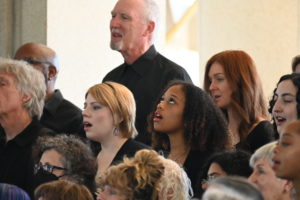

The oneness of humanity has always been a factor in the songs and readings chosen for the Choral Festival over the years. This time, participants reminded themselves to work on making that a tangible reality, especially in building unity across racial boundaries.
On the first day of rehearsals in sections, singers in the soprano group noticed they were generally gravitating to sit with others of their own race. Melodie Yates gave an impromptu, impassioned appeal, directed largely to her fellow white women, to consider how they can better follow the Baha’i teaching to “unite in actual fellowship and accord.”
Bette Roberts, a soprano who is Black, says the group “had a consultation, reflected and changed our behavior,” so that the singers sought out conversation with diverse people. Among other things, this process reminded her that any time Baha’is attempt to dissolve such barriers, everyone of every race has work to do, and “we have to say it with love.”
Afterward Yates credited Gilmer with an example that he has shown year after year, of “how to connect with each other across the boundaries of our own biases and lead with love … to be mindful of how our actions affect others.”
Life in a pandemic
Learning is in progress regarding the Choral Festival experience with COVID-19. Despite vaccination requirements for the singers, more than a dozen people contracted the disease as they rehearsed and socialized — and sometimes couldn’t help hugging after missing each other since 2019.
Several contacted the organizers afterward to say participating was still worth it for them:


![]()
![]()
Whether you are exploring the Bahá'í Faith or looking to become an active member, there are various ways you can connect with our community.
Please ensure that all the Required Fields* are completed before submitting.